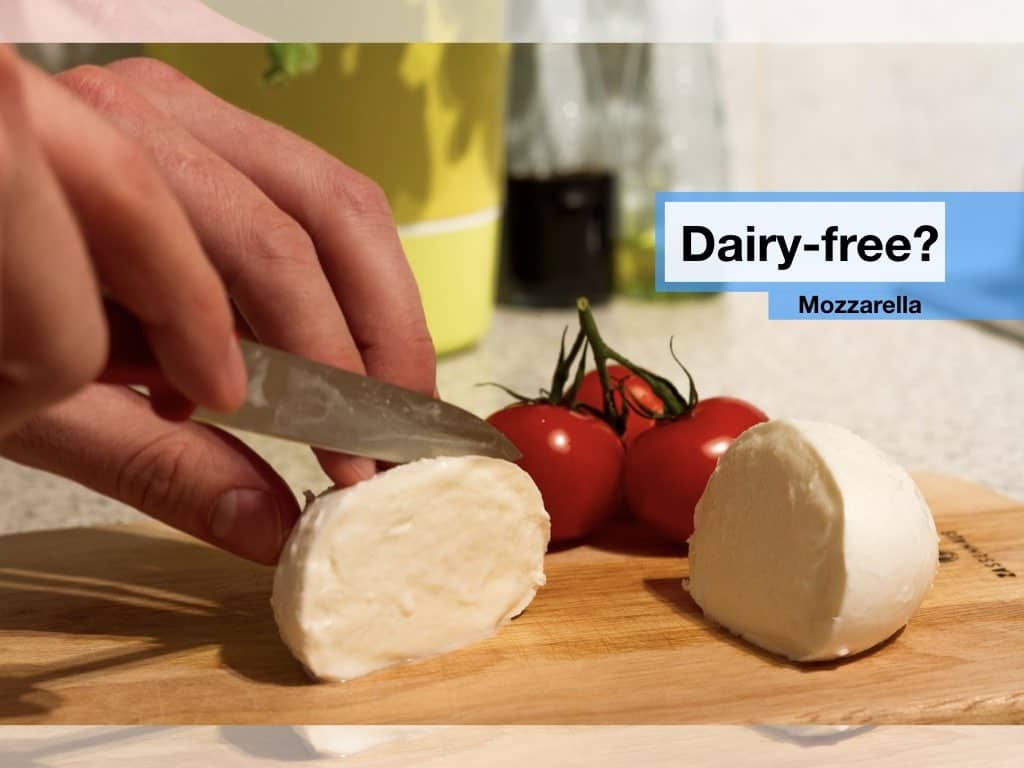Last Updated on January 17, 2024 by Aaron
Mozzarella is a traditional Italian cheese made primarily from milk. The most common form of mozzarella is produced using cow’s milk. However, there’s a more premium variant, we’ll discuss more below.
Given its milk-based origins, mozzarella is not dairy-free, making it unsuitable for those with severe lactose intolerance, milk allergies, or individuals adhering to vegan or strict dairy-free diets.
Table of Contents
What About Buffalo Mozzarella?
Buffalo mozzarella, or “Mozzarella di Bufala”, is a type of mozzarella cheese made from the milk of the domestic water buffalo rather than cow’s milk. It originates from the Campania region of Italy, particularly from areas around Naples. This cheese has a distinct taste and texture, often considered creamier and more flavorful than mozzarella made from cow’s milk.
However, even though buffalo mozzarella is made from water buffalo milk and not cow’s milk, it is still a dairy product. Therefore, it is not dairy-free.
A notable study by William J. Sheehan and Wanda Phipatanakul titled “Tolerance to Water Buffalo Milk in a Child with Cow Milk Allergy” found that a child with a cow milk allergy could consume water buffalo milk without issues. This discovery suggests that buffalo mozzarella, made from water buffalo milk, might be an option for some with cow milk allergies.
The reason behind this phenomenon is rooted in the protein structures of different types of milk. Cow milk and water buffalo milk, despite both being mammalian sources, have distinct protein compositions. While there is some degree of similarity, which can lead to cross-reactivity in allergic reactions, they are not identical.
On the flip side, buffalo milk generally has a slightly higher total solid content than cow milk, which means it has more fats, proteins, and minerals. However, when it comes to lactose, buffalo milk and cow milk have comparable levels, with buffalo milk sometimes having a marginally lower lactose content.
A study indicates that the lactose content in “Mozzarella di Bufala Campana PDO” from 4 tested samples ranges from 0.2 grams to 0.5 grams per 100 grams. That’s equivalent to about 0.2% to 0.5%.
Can You Eat Mozzarella If Lactose Intolerant: How Much?
The question of whether you can eat mozzarella depends on the severity of your intolerance and the specific product in question.
Mozzarella, especially aged varieties (also known as low-moisture mozzarella), tends to have slightly lower lactose content. As cheese ages, its lactose content further diminishes. Fresh mozzarella (the kind typically sold in water or brine) will have a slightly higher lactose content, but it still generally contains less lactose than milk.
If you want to try mozzarella, start with a small portion or piece (e.g., 10-20 grams) perhaps a cube or a thin slice, and see how your body reacts. If you don’t experience symptoms, you can gradually increase the portion size in future servings.
Now, when it comes to traditional or authentic mozzarella varieties, they usually don’t have additional ingredients that could be higher in lactose. However, some modified or processed mozzarella products might.
For example, the Velveeta Mozzarella Shreds (1), contain a notable amount of approximately 9.3% lactose, especially with the inclusion of whey and milk protein concentrate which are indicative of lactose presence in addition. The presence of modified food starch, gelatin, sodium alginate, and other additives is consistent with many processed cheese products, as these ingredients help achieve a particular texture, melt, and shelf stability.
The Dairy-free Mozzarella & Brands
For those who can’t or choose not to consume dairy, the food industry has developed dairy-free alternatives to mozzarella. These alternatives aim to replicate the taste, texture, and melting qualities of dairy-based mozzarella. The ingredients for these substitutes can vary widely, but common bases include soy, cashews, and coconut.
One of the main challenges for dairy-free mozzarella is replicating the melt of real cheese. Some brands have done this quite successfully, while others may not melt as smoothly or stretch like traditional mozzarella.
Daiya stands out among dairy-free mozzarella alternatives, known for its tapioca and coconut oil-based shreds that mimic traditional mozzarella’s melt and stretch. Another brand gaining traction is Follow Your Heart (known as Earth Island in some regions), with its mozzarella lauded for its authentic flavor. Lastly, Miyoko’s Creamery, with its cashew-based products, offers a mozzarella that closely mirrors the taste and texture of dairy cheeses.
These brands cater to a diverse audience, including those with lactose concerns.
It’s important to mention that dairy-free cheeses often have different nutritional profiles than dairy cheeses too. Plant-based cheeses generally have a lower carbon footprint than dairy cheeses.

